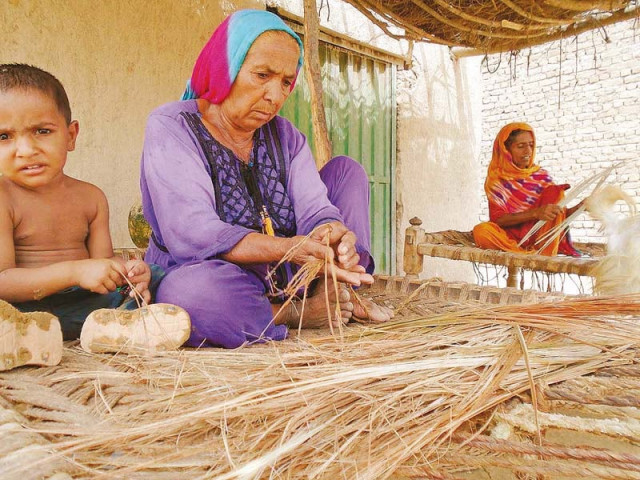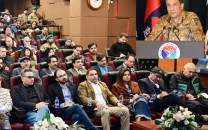A livelihood from leaves
Residents of a drought-hit district find innovative ways to make a living

WAAN OR ROPE-MAKING IN PROGRESS. PHOTO: GULSHER PANHWER
The people here make their living using a wild plant known as pesh. An estimated 80% of the women are engaged in using this plant for rope-making, locally called waan. Waan is used for weaving cots and the plant is brought to the area from Balochistan, where it grows in the wild. On average, two to three kilogrammes of waan are made daily. The raw materials for this waan is sold at Rs700 per 40kg.
 Waan is used for weaving cots and as a binding material. PHOTO: GULSHER PANHWER
Waan is used for weaving cots and as a binding material. PHOTO: GULSHER PANHWER Waan at a wholesaler’s shop, being weighed before sale. PHOTO : GULSHER PANHWER
Waan at a wholesaler’s shop, being weighed before sale. PHOTO : GULSHER PANHWERMiddle men bringing the pesh to the area sell it on the precondition that the workers will sell the waan to the agent at a lower rate than the prevailing market price. “After buying the pesh at such high prices and selling the waan at a lower rate, we get almost nothing,” said one woman from Kachho. “With no other source of livelihood, we are compelled to continue with this difficult work.”
The process of waan-making starts with separating long leaves, grinding them down with a wooden hammer, soaking and weaving them together on a wooden spinner. The phases of production put the workers at risk. During the winter, for instance, soaking the pesh can cause skin infections. During the summer, at least two workers are required to weave the cords together under the scorching sun and this often results in heatstroke and dehydration.
 The pesh — raw material for rope-making — is loaded onto trucks. PHOTO: GULSHER PANHWER
The pesh — raw material for rope-making — is loaded onto trucks. PHOTO: GULSHER PANHWER The waan is almost ready and is wrapped or coiled for sale. PHOTO: GULSHER PANHWER
The waan is almost ready and is wrapped or coiled for sale. PHOTO: GULSHER PANHWERThe dust given off by the pesh, especially during the phase where it is hammed, can cause respiratory diseases. One worker invented an improvised device to weave together the pesh by using a bicycle wheel and this technique is used by many of the workers, enabling them to produce twice the quantity of waan while saving time.
Government departments have completely neglected this home-based industry, while some not-for-profit organisations, such as Devolution Trust for Community Development (DTC), have provided seed money and equipment to women producing waan.
There is an urgent need to pay attention to this self-initiated and self-sustained source of income, which has grown into a home-based industry. The introduction of improved equipment and refined methods of production as well as financial support could help those making their living through waan, as well as reducing exploitation by middle men and vendors.
 In the first phase of waan-making, the pesh has to be pounded with a hammer. PHOTO: GULSHER PANHWER
In the first phase of waan-making, the pesh has to be pounded with a hammer. PHOTO: GULSHER PANHWERGulsher Panhwer is a consultant and freelance columnist focusing on cultural and environmental issues.
Published in The Express Tribune, Sunday Magazine, September 13th, 2015.



















COMMENTS
Comments are moderated and generally will be posted if they are on-topic and not abusive.
For more information, please see our Comments FAQ